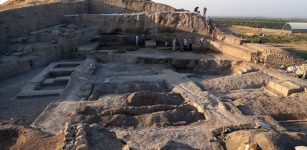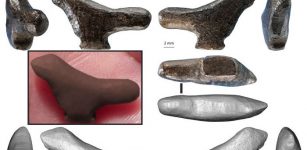Queen Dido Of Carthage: Founder Of Prosperous City On Africa’s Northern Coast
A. Sutherland - AncientPages.com - The oldest story about Dido was written by Timaeus, an ancient Greek historian who lived in the 3rd century BC. Dido’s original name ‘Elissa’ is related to El, the remote Phoenician creator god El.
From the first stories written about Dido, we learn that she was the daughter of the King of Tyre (a city in the country now known as Lebanon) and she was married to Acerbas who was a priest of Hercules.
The Death of Dido. Andrea Sacchi (1599–1661) - Public Domain
Unfortunately, her husband was killed by her own brother, Pygmalion, and Dido decided to leave her native Tyre, secretly with all her dead husband’s treasures. Elissa, best known as Dido ("the wanderer"), gathered a group of rich Phoenicians and set out on a journey. At last, after having long wandered, they went first to Cyprus, and then to the north coast of Africa in the place now known as Tunisia. They landed on the coast of the Mediterranean, in the gulf where Utica stood.
It was almost fifteen miles from Tunis, famous at this time for its corsairs. After she arrived with her people, she asked Iarbus, the Berber ruler, if she could buy some piece of land in order to settle and start a new life with her people.
Iarbus agreed but under one condition: she could buy as much land as the ox skin would cover. Dido was a very intelligent woman; she instructed her people to cut the skin of the animal into very thin strips. Then, her people covered the piece of land with the strips and thus they marked its borders.
The empty piece of land in a foreign country developed into a city and home for Dido and her people. The city was named Carthage, and Dido became the city’s first queen. Soon Carthage became a prosperous city, in which many local Berbers wanted to live.
When the power of the city grew, Iarbus demanded a marriage with Dido, threatening war if she refused.
Dido still loved her husband Acerbas. What could she do?
Dido Makes Her Decision – Wedding Is Off
Just before her wedding, she built a large fire to honor her murdered loving husband, Acerbas. Iarbus king of Getulia, would be her new husband, and he threatened with a war in case of refusal.
However, this wedding never took place because Dido had other plans. She climbed on the pyre and drawing out a dagger which she had concealed under her robe, she stabbed herself with it in front of her people’s eyes.
Dido died but among the Carthaginians, she was never forgotten. They worshiped her as a goddess and their city that Dido helped to establish was rich for 600 years until it was destroyed by Rome in 146 BC.
 Dido is buying the land for her future city of Carthage. Image credit: Mathias Merian the elder - Historische Chronica Frankfurt 1630 - Public Domain
Dido is buying the land for her future city of Carthage. Image credit: Mathias Merian the elder - Historische Chronica Frankfurt 1630 - Public Domain
A slightly different version of Dido’s story but in fact, the most popular epic, written by a Roman poet Virgil (70 BC-19 BC). According to him, while Queen Dido lived in Carthage, her city was visited by Aeneas, the ancestor of the Romans and the hero escaping from the defeated Troy.
The two fall in love and Aeneas decides to stay in Carthage as the city’s co-ruler with Dido. But the Roman gods Jupiter and Mercury remind him that he has a mission to accomplish, so unhappy Aeneas must leave Carthage and Dido and travel to Italy.
Sad and disappointed Dido commits suicide with the sword that she gave Aeneas when he first came to her city. The two former lovers meet once again when Aeneas visits the Underworld. He tries to speak to her but she turns away from him in silence. Apparently Dido never truly forgave him for his decision to leave her.
Written by – A. Sutherland - AncientPages.com Senior Staff Writer
Copyright © AncientPages.com All rights reserved. This material may not be published, broadcast, rewritten or redistributed in whole or part without the express written permission of AncientPages.com
Expand for referencesReferences:
Cotterell, A. A Dictionary of World Mythology
Rollin, Ch. A Short History of Carthage
Kulesza Ryszard, Słownik kultury antycznej
More From Ancient Pages
-
 Excavations At Oylum Höyük In Southeast Anatolia Near Syrian Border – Resumed
Archaeology | Jul 26, 2020
Excavations At Oylum Höyük In Southeast Anatolia Near Syrian Border – Resumed
Archaeology | Jul 26, 2020 -
 Should Scientists Open An 830-Million-Year-Old Rock Salt Crystal With Ancient Microorganisms That May Still Be Alive?
Archaeology | May 27, 2022
Should Scientists Open An 830-Million-Year-Old Rock Salt Crystal With Ancient Microorganisms That May Still Be Alive?
Archaeology | May 27, 2022 -
 Paleolithic Standing Bird Figurine – East Asian 3-D Art – Recovered From Refuse Heap
Archaeology | Jun 23, 2020
Paleolithic Standing Bird Figurine – East Asian 3-D Art – Recovered From Refuse Heap
Archaeology | Jun 23, 2020 -
 New Trove Of Treasures, Funerary Temple, 50 Sarcophagi Unearthed In Saqqara, Cairo
Archaeology | Jan 18, 2021
New Trove Of Treasures, Funerary Temple, 50 Sarcophagi Unearthed In Saqqara, Cairo
Archaeology | Jan 18, 2021 -
 2,000 Year-Old Books Written By Bian Que The Divine Healer Unearthed
Artifacts | May 13, 2014
2,000 Year-Old Books Written By Bian Que The Divine Healer Unearthed
Artifacts | May 13, 2014 -
 Will Archaeologists Uncover The Secrets Of A Rare Viking Ship Grave In Norway Before It’s Destroyed?
Archaeology | Nov 14, 2020
Will Archaeologists Uncover The Secrets Of A Rare Viking Ship Grave In Norway Before It’s Destroyed?
Archaeology | Nov 14, 2020 -
 Boomerangs Were Used To Shape Stone Tools By Aboriginal People
Archaeology | Aug 16, 2022
Boomerangs Were Used To Shape Stone Tools By Aboriginal People
Archaeology | Aug 16, 2022 -
 Ancient Glass Workshop Unearthed At Iron Age Of Němčice
Archaeology | Jul 24, 2023
Ancient Glass Workshop Unearthed At Iron Age Of Němčice
Archaeology | Jul 24, 2023 -
 900-Year-Old Crypt At Old Dongola: Magical Inscriptions And Mysterious Signs Found
Archaeology | Sep 12, 2015
900-Year-Old Crypt At Old Dongola: Magical Inscriptions And Mysterious Signs Found
Archaeology | Sep 12, 2015 -
 DNA Breakthrough – New Human Gene Cluster Sequence Discovered
Evolution | Nov 24, 2023
DNA Breakthrough – New Human Gene Cluster Sequence Discovered
Evolution | Nov 24, 2023 -
 Remains Of An Ancient Seaport In Asini, Greece Discovered By Underwater Archaeologists
Archaeology | Mar 12, 2025
Remains Of An Ancient Seaport In Asini, Greece Discovered By Underwater Archaeologists
Archaeology | Mar 12, 2025 -
 Medieval Burials Discovered Under London’s Westminster Abbey
News | Sep 24, 2015
Medieval Burials Discovered Under London’s Westminster Abbey
News | Sep 24, 2015 -
 On This Day In History: Great Fire Of Rome Recorded – On July 18, 64 AD
News | Jul 18, 2016
On This Day In History: Great Fire Of Rome Recorded – On July 18, 64 AD
News | Jul 18, 2016 -
 Ancient Maps Reveal What Will Happen With Our Climate In The Future – Scientists Say
Archaeology | Oct 12, 2022
Ancient Maps Reveal What Will Happen With Our Climate In The Future – Scientists Say
Archaeology | Oct 12, 2022 -
 Mystery Of Great Wall Of California: An Ancient Unsolved Enigma
Featured Stories | Oct 28, 2015
Mystery Of Great Wall Of California: An Ancient Unsolved Enigma
Featured Stories | Oct 28, 2015 -
 Unknown Sketch Of Jesus Christ By Leonardo Da Vinci Could Be The Holy Grail Of Art
News | Nov 24, 2020
Unknown Sketch Of Jesus Christ By Leonardo Da Vinci Could Be The Holy Grail Of Art
News | Nov 24, 2020 -
 When Did Humans Start Using Roads And What Civilization Built The First Paved Roads?
Archaeology | Oct 26, 2022
When Did Humans Start Using Roads And What Civilization Built The First Paved Roads?
Archaeology | Oct 26, 2022 -
 Neanderthals Were Present In Italy Much Earlier Than Previously Thought
Archaeology | Nov 6, 2015
Neanderthals Were Present In Italy Much Earlier Than Previously Thought
Archaeology | Nov 6, 2015 -
 2,000-Year-Old Huge Terracotta Jar Discovered In Turkey
Archaeology | Jan 2, 2018
2,000-Year-Old Huge Terracotta Jar Discovered In Turkey
Archaeology | Jan 2, 2018 -
 Ancient Egyptian Blue Used To Create New Nanomaterial 100,000 Times Thinner Than A Human Hair
Ancient Technology | Mar 24, 2020
Ancient Egyptian Blue Used To Create New Nanomaterial 100,000 Times Thinner Than A Human Hair
Ancient Technology | Mar 24, 2020

